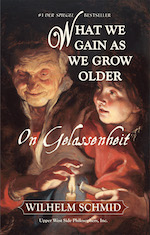(Subway Line, No. 9)
(Translated from the German by Michael Eskin)
(02/15/2016)
2016 Living Now Gold Award
“Schmid’s counsel is wise and he does not avoid the difficult topics, particularly admirable when conversations around aging and death often remain taboo.” --PUBLISHERS WEEKLY
Available as an eBook at Smashwords, Amazon, Barnes and Noble, Kobo, Apple, Blio and other fine eBook retailers.
ISBN 978-1-935830-31-3 (Softcover)
ISBN 978-1-935830-24-5 (eBook)
Learning to live with one’s own aging is the new task: making an art of what once was a given – growing older; turning our society’s anti-aging bias into a true art of aging that will enable us to live with rather than against the inevitable. In ten practical steps, this book teaches you how to welcome and embrace growing older with gelassenheit at any age.
REVIEWS
“Philosopher Schmid (High on Low) instructs readers on the art of aging gracefully and contentedly by embracing gelassenheit, a German concept denoting a relaxed attitude. Schmid provides 10 steps toward “experiencing life’s plenitude and accepting its temporal limits,” including cultivating a “reverence for habit[s]” that make life more comfortable, accepting pain and tragedy as inevitable, and strengthening interpersonal relationships. He lists numerous advantages to advanced age, including a wealth of life experience to draw from, fond memories to reflect on, and the “universal right to be passive” and even occasionally sad. On a metaphysical level, Schmid recommends mindfulness, a “wholehearted trust in life,” and, for the sake of “peace with our own finitude,” belief in the continuation of one’s existence after death. This can be interpreted as an immortal energy that carries on in the absence of our physical existence, or as a more traditional belief in an afterlife. Schmid’s counsel is wise and he does not avoid the difficult topics, particularly admirable when conversations around aging and death often remain taboo.”
“... engaging and ... important ...”
ISBN 978-1-935830-31-3 (Softcover)
ISBN 978-1-935830-24-5 (eBook)
Publication Date: February 2016
ABOUT THE AUTHOR
Bestselling author, Wilhelm Schmid is one of the world's foremost philosophers of the art of living. In his many books on topics such as 'happiness', 'love', the 'meaning of life', and 'balanced living' - to name only a few - he has created a philosophy of the art of living for our time. He lives in Berlin, Germany, and travels around the world giving lectures and workshops on the philosophy of the art of living. He has been awarded the German Prize for Outstanding Services in Conveying Philosophy to the Public (2012), and the Swiss Prize for his philosophical contribution to the Art of Living (2013).
Wilhelm Schmid in Conversation about his book HIGH ON LOW: Harnessing the Power of Unhappiness
UWSP: What enjoined you to write High on Low: Harnessing the Power of Unhappiness, and how did it come about?
WS: Everybody talks about happiness. I myself have written a short book about it. But everyone also knows from experience that there are unhappy times in life as well. And who is talking about those? The unhappy among us are left to their own devices when it comes to dealing with their unhappiness - and this I find deeply unfair. When we go through periods unhappiness, it doesn’t make sense to say: “Just think positive und be happy!“ Happiness is no light switch you can turn on and off. I know what I am talking about, for I am intimately familiar with unhappiness: during the first thirty years of my life I was often profoundly unhappy. Why? I am not sure - sometimes as a result of unreciprocated love, and sometimes just because, due to weltschmerz, ennui ... Unhappiness needs no reasons, it is part and parcel of being human, just like breathing. Inhaling: being happy. Exhaling: being unhappy. During my bouts of unhappiness, I would have loved to find understanding and empathy in others. What did I do? I began writing books, already then. Being unhappy can be very productive and creative - which is truly beautiful.
UWSP: What, would you say, is the main or most important thought or insight of High on Low?
WS: Being unhappy is not an illness. Sometimes it can even be a sign of good fortune. When people get to know the dark side of life, their lives gain depth. They find out who their true friends are, for all other friends now fade away - afraid for their own happiness, afraid of being “dragged down low“ from their “high.“ That’s why happiness can sometimes be quite asocial. Unhappy people, conversely, are often very social, very sensitive to the plight of others, showing solidarity with those who are also not doing well. They don’t run away, and develop incredible creativity and productivity. Almost all of those who have ever created anything great were unhappy: Michelangelo, van Gogh, Edith Piaf, Astrid Lindgren. Human culture would be impoverished without the unhappy, and we ought to be grateful to them.
UWSP: As you mention throughout High on Low, harnessing the power of unhappiness is a core component of the Philosophy of the Art of Living that you have been advancing throughout your career as an author, life coach, and counselor? Could you elaborate on your Philosophy of the Art of Living and explain what it aims to achieve?
WS: Thinking allows us to better understand our lives so as to be able to change them, if need be. Thus, I was able to realize that there cannot be permanent happiness even in the most beautiful love, if only because mishaps and unhappiness are an integral part of everyday life. This holds for everyone. As soon as I understand this, I no longer have to look for happiness in love. I can accept the fact that love, too, needs to breathe. Inhaling: happy times in love. Exhaling: less happy times. The philosophy of the art of living helps to preserve love and to go through life successfully even when times are bad. The art of living makes life lighter and richer. I find this kind of philosophy fascinating, for it is very close to what makes our lives real. With its help, we can learn to live life anew, which is necessary in an age in which we can no longer fall back on religion, tradition and convention when it comes to the question of how we wish and ought to live. The guiding question of the art of living is: What makes for a beautiful life that I can fully endorse? What makes for a beautiful living together with others?
UWSP: In High on Low, you make an important distinction between the state of being depressed, in its many forms, and depression understood as an illness? Could you elaborate on this distinction and adumbrate your view of what kinds of response might be most propitious and beneficial in either case?
WS: Many of those who are depressed and who often enough get diagnosed with depression are actually merely melancholy. They suffer from what we commonly call the blues, which is none other than good old melancholy - a state of soul marked by roiling emotions and thoughts, which ought not to be considered an illness. There is, however, an illness called depression, which is different from being depressed in that it is characterized by frozen emotions and an inability for reflection. The afflicted can no longer help themselves and are unable to find a way out of their minds’ vicious circles, depending on relatives and friends to stand by them, on therapists and doctors to attend to them. And while diagnosis may be complicated due to the difficult-to-define gray area between melancholy and full-blown depression, the inflated use of the latter term for anything that suggests melancholy drives the numbers of the clinically depressed to absurd levels. This may benefit the pharmaceutical industry, but not our dealing with the needs of the individual: for the melancholy person might simply need someone to talk to, and not necessarily medication; while the one suffering from depression will require medical treatment and therapy.
UWSP: Do you have any favorite writers or philosophers who have inspired High on Low as well as your Philosophy of the Art of Living more generally?
WS: Aristotle or an Aristotelian author (I no longer remember exactly) described unhappiness as a particularly wakeful state of mind, which was recently confirmed by scientists at the University of Basel: When we are depressed, we are more attentive, work more diligently and reliably. We think more deeply and make more prudent decisions. The philosophy of the art of living has a long tradition that I find very important: Socrates, Epicurus, Seneca, Montaigne, Nietzsche and many others. In the twentieth century, it was above all French philosopher Michel Foucault who inspired be to develop a philosophy of the art of living for our time, which I first laid out in my 1998 book: Foundations of a Philosophy of the Art of Living.
© 2014 Upper West Side Philosophers, Inc.

- All Titles A-Z
- 17 Vorurteile, die wir Deutschen ...
- A Moment More Sublime: A Novel
- Become a Message: Poems
- Below Zero: A Play
- Channel Swimmer: A Novel
- Descartes’ Devil: Three Meditations
- Fatal Numbers: Why Count on Chance
- Gespräch über Deutschland. Mit zwei Essays
- Health Is in Your Hands: Jin Shin Jyutsu — Practicing the Art of Self-Healing (with 51 Flash Cards for the Hands-on Practice of Jin Shin Jyutsu)
- High on Low: Harnessing the Power of Unhappiness
- Homo Conscius: A Novel
- In Praise of Weakness
- Mortal Diamond: Poems
- November Rose: A Speech on Death
- November-Rose: Eine Rede über den Tod
- Of Parents and Children
- On Dialogic Speech
- On Language & Poetry
- Összes Versei
- Passing Time: An Essay on Waiting
- Philosophical Fragments of a Contemporary Life
- Philosophical Truffles
- Spanish Light
- The Complete Plays of Lajos Walder
- The Complete Poems of Lajos Walder
- The DNA of Prejudice: On the One and the Many
- The Impostors: A Novel
- The Man Who Couldn't Stop Thinking: A Novel
- The Spectator: A Novel
- The Square Light of the Moon
- The Vocation of Poetry
- The Wisdom of Parenthood: An Essay
- The Zucchini Conspiracy: A Novel of Alternative Facts
- Tyrtaeus: A Tragedy
- Vase of Pompeii: A Play
- What We Gain As We Grow Older: On Gelassenheit
- Yoga for the Mind: A New Ethic for Thinking and Being & Meridians of Thought























